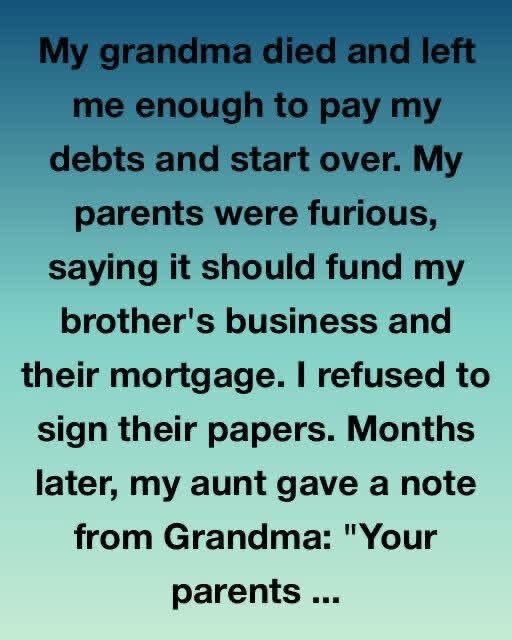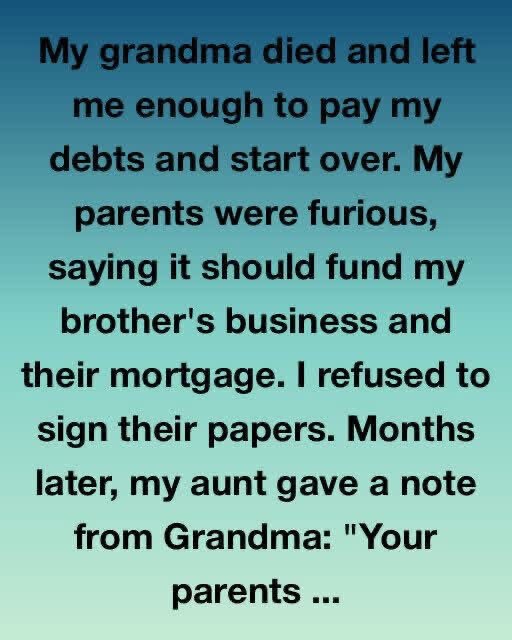
The night my aunt handed me Grandma’s letter, I read it until the ink blurred. Her handwriting was shaky, but her message was sharp:
“Your parents will try to take this from you. Don’t let them. You’ve always been the one who needed a chance. Take it.”
It felt like both a hug and a warning. I sat on the twin bed in the apartment I’d finally been able to afford, sobbing like a child. The night my aunt handed me Grandma’s letter, I read it until the ink blurred. Her handwriting was shaky, but her message was sharp:
“Your parents will try to take this from you. Don’t let them. You’ve always been the one who needed a chance. Take it.”
It felt like both a hug and a warning. I sat on the twin bed in the apartment I’d finally been able to afford, sobbing like a child.
I was never the favorite. My parents were loud—full of opinions, expectations, ultimatums. My brother had the kind of charm that turned every mess into a moment of grace. I was the quiet one. A mountain of student debt, a breakup that left me broke, a job that drained me daily. But Grandma? She saw me.
Her inheritance wasn’t massive, but it cleared my credit cards, paid off my car, and gave me something I’d never really had before: breathing room. And faith.
When I declined to sign over a chunk of it—to fund my brother’s latest startup or ease my parents’ mortgage—the fallout was swift. They stopped speaking to me. My mother texted, “You’ve changed.”
I replied, “Maybe I just stopped pretending.”
She never wrote back. The silence hurt, but over time, it began to feel like relief.
I left the marketing job that made me feel hollow and took a part-time gig at a cozy little bookstore downtown. It didn’t pay much, but it gave me my soul back. I began writing again—something I hadn’t done seriously since school. Grandma used to find my half-finished stories on her kitchen counter.
You’ve got a voice, honey,” she’d say. “Don’t let the world quiet it.”
So, under a pen name, I posted a few short pieces online. I expected nothing. But strangers started to respond. Slowly, a small community formed. They said my words made them feel understood. That kept me going.
Then I met Liana at the bookstore. She listened more than she spoke, remembered small things, and made my heart flutter like a song I hadn’t heard in years. One fall evening, walking home through a blanket of leaves, I told her about the inheritance.
“She must have really seen you,” she said. I just nodded. For once, I didn’t cry.
Liana was the second person to read my work. She curled up on the couch with printed pages and a pen in hand, scribbling in the margins:
“This line hits.”
“Say what you’re afraid to say.”
“You’ve got something here.”
And because she believed it, I did too.
Six months later, I self-published a collection. It didn’t explode—but it reached the right readers. One day, an email landed in my inbox:
“Ever considered writing a novel?”
I stared at it until my eyes burned. Then I forwarded it to my aunt with a simple line:
“She was right.”
My aunt replied:
“She always was.”
The first draft was a mess. The second hurt. The third felt like I was carving pieces of truth out of myself. It was fiction, technically, but every page held threads of Grandma, and bits of the girl I’d buried to keep others comfortable.
The book released a year later. No fanfare, no parties—just a quiet hum of success. A podcast interview. A mention on morning radio. A message from a librarian saying a teenager in her town felt less alone because of my story.
That was the moment that meant the most. Someone was listening.
And then—my brother showed up.
No call, no warning. Just him, in a pressed coat and familiar smile, stepping into the bookstore like nothing had happened. I nearly dropped a box of bookmarks.
“Hey, sis,” he said. “Can we talk?”
I braced for the ask. But he simply said, “I read your book.”
And then, “I cried.”
We sat outside the coffee shop. He told me the business failed. He’d moved back in with our parents. They were furious—not just at him, but at me, too.
“They think I let you get away with it,” he said.
“I didn’t. You just did the right thing. I didn’t get it… until now.”
It wasn’t exactly an apology. But it was a start.
I told him about Grandma’s note. He looked out at the street.
“She loved you differently,” he said.
“I used to think that wasn’t fair. Maybe she saw something we didn’t.”
The book did better than any of us expected. I spoke at a few colleges. My agent—still wild to say—called with news: a film company was interested. I stood in my kitchen, toast forgotten, and whispered,
“Thank you, Grandma,” to the still air.
Then another letter came. No return address. Inside: Grandma’s original will—not the version my parents had shown me. This one left everything to me. The house. The land. The savings. Tucked inside was a final message:
“If they try to change the story, tell your own.”
Turns out, my parents had forged a version. Tried to push it through quietly. But Grandma—always one step ahead—had mailed the real copy to a lawyer in another state, with instructions to deliver it one year after her passing.
I could’ve taken it to court. Pressed charges. Gone public.
Instead, I mailed them a copy with a single note:
“I know.”
They never responded.
My aunt called a few days later.
“Your grandma knew exactly what she was doing.”
I kept the house. Small, with creaky floors and a garden that had gone wild. It felt like it had been waiting for me. That spring, Liana and I moved in. She planted sunflowers. I painted the walls. We filled it with mismatched furniture and honest joy.
Sometimes, I still hear Grandma’s voice in the quiet:
“You’ve got something to say, honey. Say it.”
So I do.
My brother visits now and then. We sit on the porch with iced tea and slow conversation. We don’t rewrite history. We choose peace. My parents stay silent. I set the boundaries I should’ve drawn long ago, and let the ache live where it must.
If there’s a takeaway, it’s this:
The people closest to you won’t always see your worth. They might try to mute your voice or revise your story to fit their narrative. But your voice is yours to claim.
And if you’re lucky, someone—a grandmother, a partner, a stranger online—will hand you the permission you couldn’t give yourself.
Not because you’re famous. Not because of money.
But because you kept going.
So here’s to the quiet ones. The overlooked. The ones with trembling hands and roaring hearts.
Your story matters.
Keep telling it.
